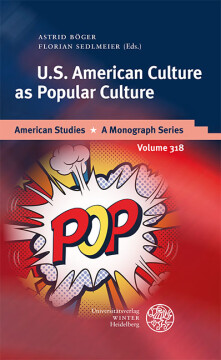
BUCH
U.S. American Culture as Popular Culture
Herausgeber: Böger, Astrid | Sedlmeier, Florian
American Studies – A Monograph Series, Bd. 318
2023
Zusätzliche Informationen
Bibliografische Daten
Abstract
This volume of original essays presents an overview of Popular Culture Studies as an ever-growing branch of American Studies while also reflecting the critical debates driving the field toward a more nuanced approach to contemporary culture more generally. Thus, many of the essays included take fresh perspectives on Black American culture, feminism, multiculturalism, and queer studies, among others, but they also provide critical updates on the global impact of U.S. American popular culture. If an understanding of U.S. Culture as Popular Culture in its national and international dimensions is one of the aims behind this publication, another is to conceive of cultural formations against the backdrop of shifting media environments. Placed alongside more traditional media such as literature and film, more recent phenomena including reality television, internet memes, and video games add considerable relevance to the critical appreciation of culture in the twenty-first century.
Inhaltsverzeichnis
| Zwischenüberschrift | Seite | Aktion | Preis |
|---|---|---|---|
| Cover | Cover | ||
| Titel | 3 | ||
| Imprint | 4 | ||
| Contents | 5 | ||
| ASTRID BÖGER and FLORIAN SEDLMEIER: Introduction: U.S. Culture as Popular Culture | 9 | ||
| Section I: Film and Television | 27 | ||
| MAXI ALBRECHT: “A New Beginning”: AMC’s ‚The Walking Dead‘ and the Serial Post-Western | 27 | ||
| ABIGAIL FAGAN: Jubal Early in Space: The Settler Colonial Hauntings of Joss Whedon’s ‚Firefly‘ | 45 | ||
| BRIGITTE GEORGI-FINDLAY: Visions of the Past, Politics of the Present: The Temporalities of Western Television Series | 63 | ||
| LINDA M. HESS: “What I would have done to have heard a story like mine”: Reading Tig Notaro’s and Hannah Gadsby’s Stand-up as Autobiographical Narrative | 79 | ||
| CARSTEN JUNKER: Pernicious Plurability: ‚Liberty’s Kids’‘ Militainment and the Lure of Diversity | 99 | ||
| KATJA KANZLER: Conspicuous Contempt: Popular Culture and the Invective Performativity of Taste | 117 | ||
| MICHAEL LOUIS MOSER: Deviations from Network Late Night and Cable Parody News: Colbert’s ‚Late Show‘ and Meyers’s ‚Late Night‘ | 135 | ||
| JOHN STREET: From ‚The West Wing‘ to ‚House of Cards‘, from Randy Newman to Donald Trump: Politics as Popular Culture, Popular Culture as Politics | 153 | ||
| MARITA STURKEN: Comedy, Genre, and Netflix in Post-Irony American Popular Culture (or Disruption, Comedy, Humorlessness, and Genre Flail | 175 | ||
| JENNIFER VOLKMER: Motorcycle Riding in Movies as Modern-Day Pilgrimage to Masculinity | 191 | ||
| Section II: Literature | 209 | ||
| LAURA BIEGER: Public Intellectuals, Cultural Fields, and the Predicaments of Popularity; or, Richard Wright Meets Pierre Bourdieu | 209 | ||
| RUTH GEHRMANN: “So she would ask me to tell her stories”: Indigenous Narratives of the Apocalypse in Cherie Dimaline’s ‚The Marrow Thieves‘ | 227 | ||
| ALEXANDRA HARTMANN: “Women’s work is never easy, never clean”: (Strong) Black Womanhood and the Carceral State in Tayari Jones’s ‚An American Marriage‘ | 247 | ||
| ZOHRA HASSAN-PIEPER: Muslim Misrepresentation and the Post-Empire Imaginary in Craig Thompson’s ‚Habibi‘ (2011) | 267 | ||
| MARIUS HENDERSON: “Matrixial” Dismantlings of Anti-Black Gendered Violence in Popular Culture | 289 | ||
| MARIAN OFORI-AMOAFO: Different Ways of (Not) Being Black: Blaxploitation Meets Post-Soul in ‚I Am Not Sidney Poitier‘ | 309 | ||
| CLARA PETINO: “Lace Reading” and “Physick Recipes”: Wicca and Modern Witches in Salem Literature | 333 | ||
| HEIKE STEINHOFF: Beyond Hashtags: Popular Feminisms, Body Positivity and Self-Help Books | 351 | ||
| LISANNA WIELE: Transgression Inscribed: The City Mysteries’ Queer Urbanity | 369 | ||
| HARALD ZAPF: The Long Shadow of Romanticism: (Un-)Popular Theories of Lyric Poetry and the Popularity of the Lyric | 387 | ||
| Section III: Other Media and Art Forms | 407 | ||
| JULIANE BOROSCH: Changing the Metonymy: Michigan Central Station and the Face of Detroit | 407 | ||
| DUSTIN BREITENWISCHER: | 429 | ||
| NAGHMEH ESMAEILPOUR: Transmedial Historiography and the Representation of Iran and Iranians in Video Games | 451 | ||
| MARLON LIEBER: Money Form and Master Painting, or, When Warhol Wanted to Paint the Universal Equivalent Form | 475 | ||
| FRANK MEHRING: “You Can’t Always Get What You Want!” Sonic State Fantasies and the Political Use of Popular Music under Barack Obama and Donald Trump | 495 | ||
| JOHANNES C. P. SCHMID: Internet Memes as Popular Cultural Practices | 515 | ||
| GUNTER SÜß: In Praise of Short Forms: Teaching American Cultural Studies with Music Videos by African American Artists | 539 | ||
| List of Contributors | 561 | ||
| Backcover | Backcover |


 Publishing Platform by CloudPublish
Publishing Platform by CloudPublish